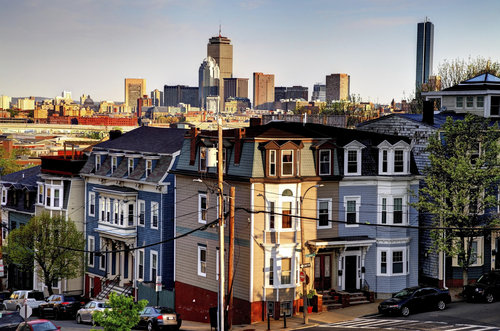Boston is not alone in solving the shortage of housing supply: High demand for housing combined with a lack of inventory at a range of price points is widely cited as one of America’s most pressing economic challenges. A significant factor in this situation is the rising cost of construction, but it’s not just the price of land and materials that have gone up. According to a recent study from Buildzoom economist Issi Romem, while material costs have grown uniformly throughout the U.S. in the last decade, labor cost growth has varied considerably from one place to another.
Perhaps unsurprisingly, Boston boasts some of the highest building costs of all compared to the national average. Buildzoom found that construction costs here were 11.3 percent higher than the average among the nation’s 30-largest cities. Most of that divergence comes from Boston’s higher labor costs, although it could be worse. In San Francisco, for example, labor costs have risen around 32 percent faster than materials prices since 2008. Further, Buildzoom found that in cities where new construction rates have declined, labor costs rose faster. Boston came out ahead of many cities in this regard because it posted higher new construction permitting rates, and thus saw slower labor cost appreciation than it may have otherwise.
In other local real estate news:
- Boston-area Guaranteed Rate loan officer Shant Banosian became the first originator in the company’s history to exceed $500 million in total funded loan volume within a calendar year, according to a Dec. 18 press release from the lender. Banosian joined Guaranteed Rate’s Waltham branch in 2012 and quickly became known as one of the company’s top originators nationwide. As of his latest milestone, Banosian has closed more than 1,100 units year-to-date, and counts a career volume total of more than $2 billion in funded loans. “Shant’s accomplishments this year are a reflection of his unrivaled work ethic and commitment to his customers,” said Guaranteed Rate founder and CEO Victor Ciardelli. “Shant is a professional in the truest sense of the word who helps everyone he comes in contact with perform to their potential.”
- A group of developers led by Millennium Partners received approval from the city’s Planning and Development Agency on Dec. 13 to start work on a 30-story residential tower in Boston’s Chinatown. The $175 million project is related to Millennium’s recently approved $1.35 billion Winthrop Square tower nearby. As part of that larger project, the developer is required by the city to include a certain number of affordable housing units, which the Chinatown tower will include. Currently, plans call for a total of 152 residential units, with 45 of them being designated low-income apartments and the rest designed as condos at low- to middle-income price points. A timeline for the project’s completion was not yet available.
- Massachusetts was the 15th-fastest growing state in the U.S. between 2010 and 2018, according to new estimates from the Census Bureau. While the state’s 5.4 percent population gain was below the U.S. average of 6 percent overall, it still added more residents as a percentage of its total population than most other New England states. In fact, neighboring Connecticut was one of the few states to lose residents over that period. The states with the fastest population growth rates in the last year included Nevada, Idaho and Utah.
- Newbury College in Brookline will close its doors this spring, and now much of the school’s real estate is expected to hit the market. Newbury’s campus includes six properties owned by the school with a combined assessed value of almost $38 million, the Boston Globe reported. Real estate analysts told the Globe they expect the parcels to fetch high prices given their location near Cleveland Circle and a Green Line stop. Homes surrounding the campus have recently sold for upwards of $2 million. However, it’s unclear whether the properties could be redeveloped into commercial or multifamily assets that would present a more profitable deal for any future developer, compared to the single-family homes the area is currently zoned for.

